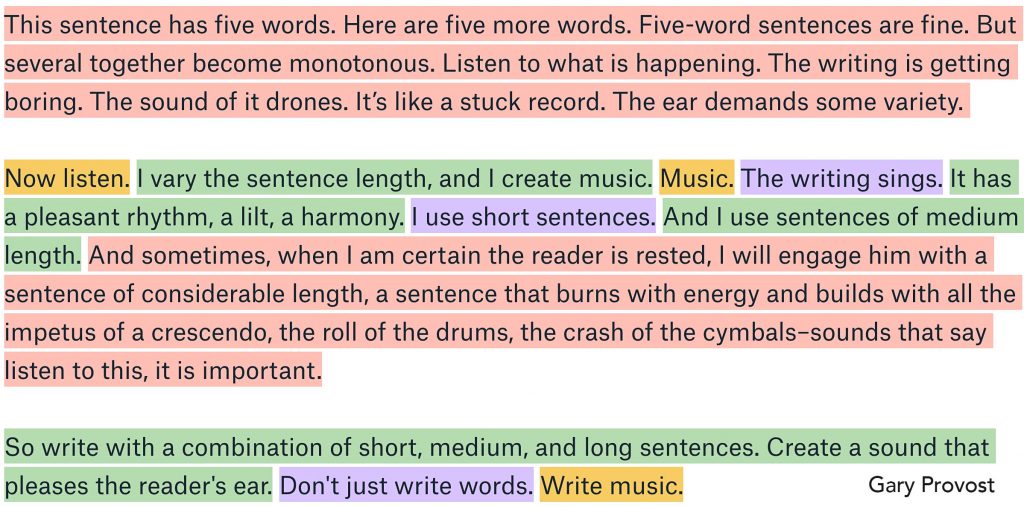
I never knew what syntax was, or how important it was in your writing, until this week. I am reading a book at the moment, “First You Write a Sentence.” by Joe Moran.
Moran explains, in plain English, the elements of writing well and the starting point is the sentence.
Syntax is the order in which you place the words and is something to which I never gave much thought. Moran, a university professor in the UK, says syntax is vital in good writing.
“Time, manner and place” is the first note I took from this book. Your sentence will often include when, where, and how something happened.
He warns against overuse of nouns and what he calls the ladder of abstraction. He tells us to use verbs liberally as verbs convey motion and action.
And he advises you to read your words aloud because the reader will be doing this in her own mind.
Sentences should be as much like speech as you can make them therefore use plain language with short words. Short words mean more stresses in the speech and you should cut syllables where you can.
Writing in plain language is recommended but it is a style. There is nothing wrong with long sentences and they have a place once used appropriately. Balance between long and short sentences is critical.
Do not use subordinate clauses with a hierarchy; use commas to make the sentence like poetry by breaking it up into smaller phrases.
Cut adverbs and adjectives and use parataxis. Parataxis is the placing of clauses or phrases one after another without coordinating or subordinating connectives. If you use an adjective consider using it after the noun, not before.
Economy in writing is important but it can be overvalued. Varying the length of your sentences is strongly recommended.
A cumulative sentence starts with a simple thing and more intricate things can be added in small layers.
A dash allows you to emphasise a phrase, brackets can show something with less stress, as if you are interrupting yourself in your inner conversation. Commas are the best way to deal with long sentences as they do not add or remove stresses.
The above is what I believe are the most important points to be extracted from the book, so far. I have about 30% to read and may pick up more valuable information.
It is easy to get bogged down in trying to fit your writing to some formula or list of tips, even though they may be helpful pointers.
But the most important lesson I think I can take is that sentences should be as much like speech as you can make them. And to use plain language with short words and short sentences, even though he also recommends varying the length of sentences and Moran does not write overly short sentences in his own book.
Anyway, writing like you speak is the style of writing used in “Catcher in the Rye” by JD Salinger. Holden Caulfield, from the first few sentences, sounds just like he is speaking to you in a chat.
Here’s the first two sentences,
“If you really want to hear about it, the first thing you’ll probably want to know is where I was born, and what my lousy childhood was like, and how my parents were occupied and all before they had me, and all that David Copperfield kind of crap, but I don’t feel like going into it, if you want to know the truth. In the first place that stuff bores me, and in the second place, my parents would have about two hemorrhages apiece if I told anything pretty personal about them.”
And the first one is a long one but the style is definitely writing like speaking.
Anyway, my biggest problem is writing every day and what to write about. I want to write frequently as I feel the benefits of habitual, frequent writing but what to write about can be a problem.
I feel the difficulty more acutely when I have not done it for a long period of time because just getting started can be hard.
What you take for granted when you are doing it every day does not come easily or naturally after a period of absence.
Another problem is the enjoyment I get from listening to and reading books by nineteenth century writers such as Anthony Trollope, Charles Dickens, and Thomas Hardy. The style of writing used by these writers could not be much further removed from “short words, short sentences, plain language” style recommended now.
It is difficult to reconcile these styles and their vocabulary with using small, common words and small sentences.
Conclusion
If you have an interest in writing well, and you should, this book is an excellent investment. If you only take a handful of tips from it you will have a sound strategy and grounding for written communication for your lifetime.
And even though the trend nowadays is for the use of video and consumption of media on mobile devices the power of the written word persists. Good writing, being effective communication, can provide the basis for stunningly effective video marketing.